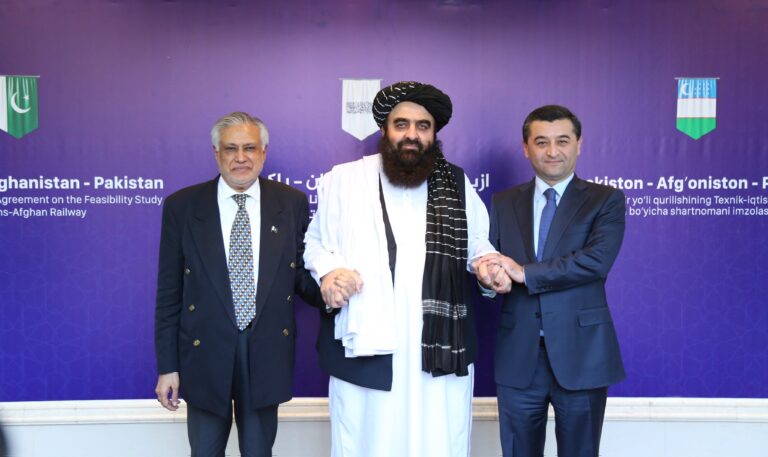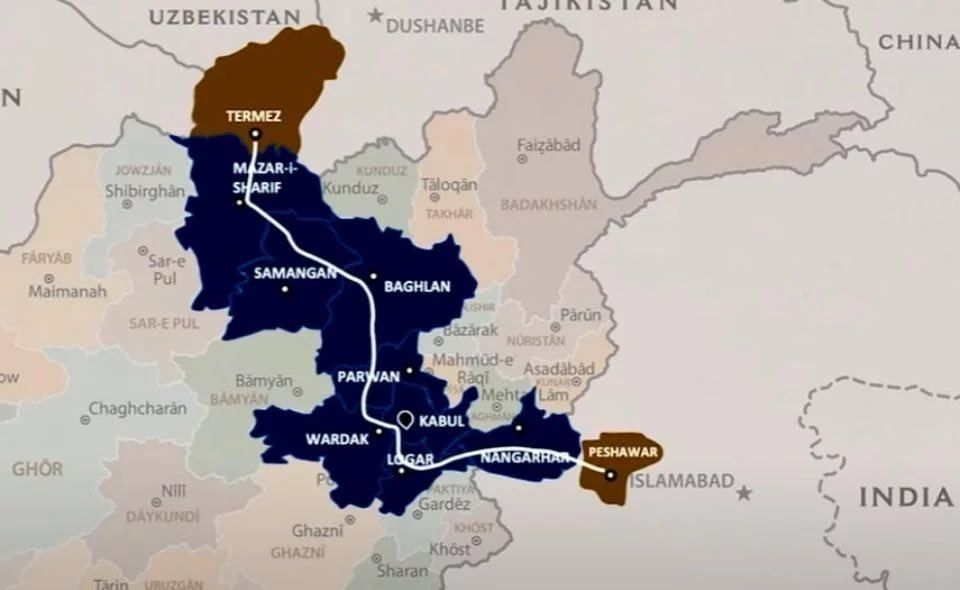Review of Afghanistan developments
The signing of the agreement regarding the feasibility study for the Trans-Afghan Railway project should be regarded as another significant milestone in the relationships among the countries in the region. On Thursday, July 17, the foreign ministers of Pakistan and Uzbekistan arrived in Afghanistan, where the agreement concerning the feasibility study of the Trans-Afghan Railway along the route “Termez-Nayibabad-Maidan Shahr-Logar-Kharlachi” was executed by the Minister of Transport of Uzbekistan, the Acting Minister of Public Works of Afghanistan, and the Minister of Railways of Pakistan. Given the geopolitical significance of Afghanistan in this initiative, Kabul was selected as the location for the signing ceremony of the agreement. As stipulated in the agreement, all activities related to the feasibility study of the project will be overseen by the main office situated in Tashkent, with branches in Kabul and Islamabad providing the necessary collaboration.
The execution of a trilateral accord among Uzbekistan, Afghanistan, and Pakistan regarding the studies of the Trans-Afghan Railway marks not only the commencement of a significant infrastructure project but should also be viewed as a political declaration for regional collaboration.
The Trans-Afghan Railway from the Perspective of Uzbekistan, Pakistan, and the Taliban Government
Uzbekistan: Pursuing Strategic Interdependence
Uzbekistan’s foreign policy during Mirziyoyev’s administration is founded on two primary pillars: a pragmatic approach to foreign relations and constructive regionalism. Engagement with the Taliban government and involvement in the major initiative of the Trans-Afghan Railway are rooted in these two foundational aspects of Uzbekistan’s foreign policy. Tashkent views the Taliban’s rule in Afghanistan not as a challenge but as an opportunity, as the Taliban has managed to eliminate power islands, establish nationwide governance, and eagerly engage in regional initiatives.
In a period when the majority of countries are either refraining from or have embraced conditional and careful interaction with the Taliban government, Uzbekistan has prioritized “strategic interdependence” and is confidently engaging with Kabul. Tashkent is fully cognizant of the Qosh Tepe Canal initiative and its implications; however, it has reached a profound realization that only through interdependence can it address this water issue between the two countries.
Pakistan: New Security-Economic Architecture
Pakistan perceives the Trans-Afghan Railway as an embodiment of its geoeconomic and geopolitical strategy aimed at accessing Central Asia, which it refers to as “strategic economic depth.” Islamabad regards this project as a means to recalibrate its geopolitical influence within regional dynamics. For Pakistan, the Trans-Afghan Railway serves as a foundation for enhancing economic diplomacy, addressing competition with India, and mitigating the repercussions of instability in Afghanistan. According to Pakistan’s strategic elite, this project transcends mere transportation; it represents a component of a developing security-economic framework.
Following three years of strained relations with the Taliban government regarding the Tehreek-e-Taliban Pakistan group, Pakistan has come to the conclusion that it cannot achieve its regional grand strategies through its existing policy. Consequently, it is now aiming to reduce tensions with Kabul. The repeated visits of Pakistani Foreign Minister Ishaq Dar to Kabul, along with invitations extended to Taliban government officials to visit Islamabad, indicate that Pakistan is attempting to move away from a policy of blame or accusations and is looking for opportunities to collaborate with Kabul.
The Taliban government: transition from war to development
The Taliban administration perceives the Trans-Afghan Railway as a pivotal economic initiative and a representation of the shift from conflict to development. The Taliban administration regards the Trans-Afghan Railway as a means to assert its role as an effective and competent authority in overseeing regional projects, viewing it as a chance to enhance transit revenues and incorporate Afghanistan into regional economic frameworks. Moreover, the Trans-Afghan Railway, in line with the Taliban administration’s foreign policy of “active neutrality,” has the potential to serve as the foundation for establishing a new economic order in the region, wherein Afghanistan evolves from an unstable buffer zone into a strategic hub.

Iran’s interests in the Trans-Afghan Railway
The Khaf-Herat railway project can be regarded as Iran’s key asset in the Trans-Afghan Railway endeavor. This railway line, which has now reached the vicinity of Herat and is operational, is also undergoing rapid implementation of its fourth phase. In addition to enhancing Herat’s strategic significance in terms of its economic standing, it will link Iran and its railway infrastructure to Central Asian nations and China. Following the establishment of the Khaf-Herat railway, one of Iran’s strategic objectives was to develop the Herat-Mazar-e-Sharif railway. Conversely, the Taliban administration aims to transform Herat into Afghanistan’s primary transit center, which is why it views the Mazar-e-Sharif-Herat railway as an integral component of the Trans-Afghan Railway project. In this context, discussions have taken place with Uzbekistan to facilitate the execution of this project.
The construction of the Herat-Mazar-e-Sharif railway, which is a component of the Trans-Afghan project, will enable Herat, Afghanistan, to emerge as a regional logistics hub, providing both economic and geopolitical advantages for the nation. Additionally, this segment will grant Iran rail access to China through a more direct route, as it is part of the five-nation railway initiative involving Iran, Afghanistan, Uzbekistan, Tajikistan, and China.
Furthermore, an additional segment of the Trans-Afghan Railway is set to be constructed by Turkmenistan and Kazakhstan, with financial backing from Russia. This segment will commence at Turgandi in Herat, extend to Spin Boldak in Kandahar, and subsequently reach the Chaman border in Pakistan. Planning is currently underway for a portion of this initiative from the Turkmen border to Herat. This undertaking will establish the most direct land connection between Russia and India via Afghanistan, with Chabahar Port being a crucial component of this route.
Related articles
Geo-economics reasons for Russia’s proximity to the Taliban
The impact of recognizing the Taliban government
In the Trans-Afghan Railway initiative, which represents a beginning for collaboration instead of conflict, greater emphasis should be placed on Uzbekistan’s emerging role in the region. While the project remains far from completion, its ambitious initiation by Uzbekistan demonstrates that the country has evolved from being a peripheral participant in the region to a standard-setting entity, a transformation that is particularly noticeable in Afghanistan during the Taliban’s governance.

















